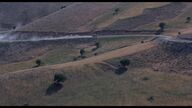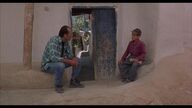To be honest, this is a relatively boring film. If it weren't for the previous experience in the field, it would not have been so enjoyable, but it is the anxiety in the field that makes people feel the same boredom as the protagonist. A more interesting detail is that communication in the village is more difficult, so every time the protagonist answers the phone, it takes several minutes to drive to a hill near the cemetery to get the signal, and every time he answers the phone, he will follow A villager who was digging a trench chatted a few words. Abbas is a director who is good at showing the relationship and inner changes of characters by grasping the dialogues of the characters. In the movie, the protagonist and the well-digging Joseph never met, but the relationship established through conversation, from the beginning of greetings In a polite manner, slowly the protagonist began to admire Joseph's simple work alone and the simple happiness with his girlfriend, and later when Joseph was buried in the trench, the protagonist did not hesitate to seek rescue from other villagers, despite the sudden death. In fact, it can also accomplish his shooting. Finally, a discussion about life and death between the protagonist and the doctor became the key to changing his mind. Always is a disease, but the doctor said that there is a more terrifying disease than old, and that is death, because it means no longer being able to appreciate the beauty, no longer being able to enjoy the beauty of nature, no longer being able to experience the joy of life... So the protagonist Realizing that the death of others might not have been expected, when the old man finally left, he drove out of the village.
In fact, I don’t particularly like this, using character dialogue to explore the form of expression of the theme of the film, and the most extreme use of this form is Abbas’s "Love Dialogue" last year, which is a typical chat film. Anyway, the long-range shots in the film are so beautiful that they make people want to go to Iran.
View more about The Wind Will Carry Us reviews







